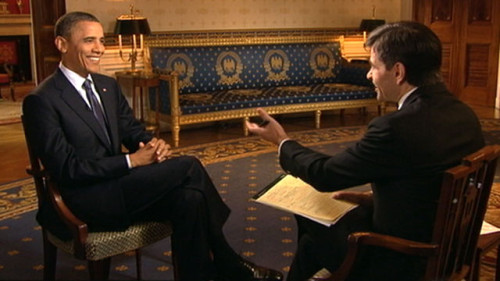President Obama spoke with George Stephanopoulos of ABC News on Sunday morning about the status of the nuclear talks with Iran.
While saying that it was “too early to tell” if a comprehensive settlement would be agreed by Monday’s deadline as “the gaps are still significant”, Obama asserted that the process had been valuable in ensuring that Iran did not pursue a militarized nuclear program: “Iran has followed the terms of the [November 2013 interim] deal.”
The President maintained pressure on the Iranians — “they’re sort of on their own” — and indicated he would consider the extension of the talks.
He concluded: “I think ultimately [a deal] would be good for the people of Iran. You know it’s a big country with a lot of talent, a lot of sophistication.
STEPHANOPOULOS: Big deadline coming up on the Iranian nuclear negotiations — on Monday. Is there gonna be a deal?
OBAMA: It’s too early to tell. I know that Secretary Kerry and the Foreign Minister Zarif of Iran are in some pretty intensive discussions right now. The good news is that the interim deal that we entered into has definitely stopped Iran’s nuclear program from advancing, and in some cases has actually rolled back some of the things that they were doing — their stockpiles, for example, how they enriched uranium. So it’s been successful, and Iran has followed the terms of the deal.
STEPHANOPOULOS: The deal would require rollback, wouldn’t it?
OBAMA: Well, so, now the question is, can we get to a more permanent deal. And the gaps are still significant. I think that our goal has consistently been to shut off a whole bunch of different avenues whereby Iran might get a nuclear weapon, and at the same time make sure that the structure of sanctions are rolled back step for step as Iran is doing what it’s supposed to do. I think Iran would love to see the sanctions end immediately, and then to still have some avenues that might not be completely closed, and we can’t do that.
So the good news is that the negotiations continue, and most importantly, that the international coalition that has made sanctions so effective has held. The P5+1 [5+1 Powers] has held. Russia and China, you know where we often have tensions — you know, with Russia big tensions lately — nevertheless they’ve acknowledged that our position is a fair one, and the question now just becomes, “Can Iran say yes?”, and they’ve got their own hardliners.
STEPHANOPOULOS: They’d say the question is, “Can you say yes?”
OBAMA: Well the difference is I’ve got the entire international community on my side, and they’re sort of on their own.
STEPHANOPOULOS: Are you willing to extend if there’s no deal by Monday?
OBAMA: You know, I think that what we’re going to do is take a look at what emerges over the course of the weekend.
STEPHANOPOULOS: One final question on that. You know both you and President Rouhani have some constraints. He’s got the Ayatollah [Supreme Leader]: you have Congress. Are you confident that if you reach a deal, Congress will back it?
OBAMA: I’m confident that if we reach a deal that is verifiable and ensures that Iran does not have breakout capacity, that not only can I persuade Congress, but I can persuade the American people that it’s the right thing to do. Our goal is never to resort to military actions as a first resort: our goal is to solve a particular problem here, which is making sure Iran doesn’t trigger a nuclear arms race, doesn’t threaten the United States, can’t threaten allies like Israel. If we’re able to accomplish that goal, if I’m confident of it, and my experts and the technical people can say here’s the science behind why they can’t break out and we have verifiable mechanisms in place, then I’m confident I can sell the deal to the country.
STEPHANOPOULOS: And then Iran joins the fight against ISIS [Islamic State]?
OBAMA: Well, you know, Iran is already fighting ISIS through its various surrogates. We’re not going to be anytime soon coordinating military activities with Iran, because keep in mind even if we solve the nuclear problem, we still have the problem of Iran sponsoring terrorist activities in the region, we still have problems in terms of their attitude towards friends like Israel. So there’s going to be a long path towards normalization of our relationship with Iran.
What a deal would do is take a big piece of business of the table and perhaps begin a long process in which the relationship not just between Iran and us but the relationship between Iran and the world, and the region begins to change. I think ultimately that would be good for the people of Iran. You know it’s a big country with a lot of talent, a lot of sophistication.
You know, Iran’s not like North Korea, a country that’s just completely isolated and completely dysfunctional. So they have the opportunity, I think, to really thrive. I suspect President Rouhani would like to seize that opportunity, but in the end he’s going to have to deal with his politics at home, and he’s not the ultimate decider inside of Iran; the Supreme Leader is.

